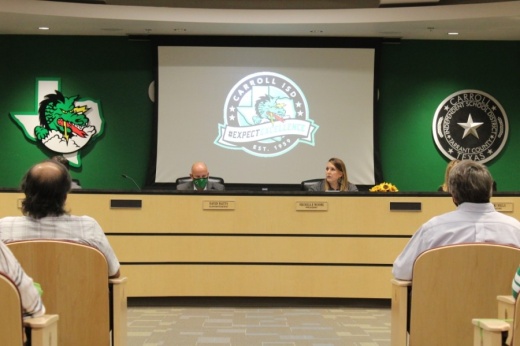An emergency motion for the temporary restraining order was requested by Kristin Garcia, who filed a civil suit against the district on Sept. 2 over alleged violations of the Texas Open Meetings Act.
The order signed by District Judge Josh Burgess on Nov. 30 requires all work on the plan, including clarification, revisions, publication or implementation, to cease. The order applies to the Board of Trustees and any involved district subcommittees.
A motion requesting the temporary restraining order came after Interim Superintendent Jeremy Lyon sent an email asking the volunteers serving on the District Diversity Council to continue work on the plan.
“Go back into work the subcommittee previously completed and revisit it. If there are revisions, make them,” Lyon wrote in a Nov. 12 email attached as an exhibit in court documents.
The judge’s order states that by moving forward with revisions, the board “is attempting to deprive the plaintiff of the remedies available to her under” the Texas Open Meetings Act.
In an online statement released to the public on Dec. 2, Lyon addressed the temporary restraining order. He wrote that although the district plans on complying with the order, it will work to overturn it because of a lack of clarity as to what the order entails.
“Tuesday’s [temporary restraining order] ruling represents a deliberate roadblock by those taking legal action,” Lyon said in the statement. “It halts our efforts to hear community concerns and move forward in resolving this issue for the good of current and future Dragons.”
Lyon also addressed the ongoing legal action against the school board for alleged violations of the Texas Open Meetings Act.
“These allegations have nothing to do with the work of the [District Diversity Council] and rather serve as an attempt to discredit and derail this important work,” he said in the statement. “In fact, much of the dialogue and information that was circulated about the DDC’s plan by those who oppose it was a deliberate misrepresentation of the plan’s contents and purpose.”
Dustin Fillmore, lead attorney in the suit against the district, declined to comment on the case or on Lyon’s statement.
The Texas Open Meetings Act requires “meetings of governmental bodies to be open to the public, except for expressly authorized closed sessions and to be preceded by public notice of the time, place, and subject matter of the meeting,” according to a handbook on the state law.
The lawsuit was filed after the release of a series of text messages among five board members discussing how to approach the Cultural Competence Action Plan before a scheduled Aug. 3 board meeting.
State law requires such board discussions to be held in public. The judge’s order references these conversations held prior to the board meeting as “secret deliberations.”
The five-year action plan was created by the District Diversity Council after videos surfaced online of Carroll ISD students using racial slurs in the fall of 2018 and in February 2019. Due to the COVID-19 pandemic, the first draft presentation of the plan to the school board came at that Aug. 3 meeting.
The plan touches on several topics, including promoting cultural competence within the school district, advocating for and supporting culturally competent and responsive programs and policies as well as engaging students, staff and faculty in collecting feedback on cultural competence within the district.
Following strong opposition from some community members, the board pledged to hold off on taking any action on the plan until a new superintendent was hired. On Nov. 20, the board announced that Lane Ledbetter, a Carroll ISD Class of 1989 graduate, was the lone finalist for superintendent. He is expected to be confirmed on Dec. 11 following a 21-day trial period.
A court hearing is scheduled for Dec. 14 to consider a temporary injunction in the civil lawsuit.





